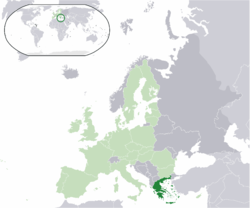Greece’s Election: Balance Of Imbalance
By JTW
By Mustafa Kutlay
Greece left behind a new threshold followed by the whole world with the elections held on June 17. The power game that has continued until today, alternating between the country’s two main parties, the center- right New Democracy Party and the center-left PASOK, has given way to the multiparty system for the first time with the shocking effect of the economic crisis. Nearly 30 percent of votes of the New Democracy Party completing the elections in the first place, makes it possible the New Democracy – PASOK coalition because the Greek electoral system provides a theoretical possibility (although borderline) of establishing a majority government of Samaras with the PASOK which has received 12 percent of the votes.

The coalition can help Greece breathe in, taken into account that these two parties go along with staying in euro and fulfilling Greece’s commitments to date. Many European politicians, including Angela Merkel in particular, request in this direction… Because the radical-left SYRIZA which made a pre-election rally with opposition to rescue packages has made European leaders’ hair stand on end. Especially Spanish banks liquidity bottleneck and the rise of borrowing interest rates to “historical levels” in Spain have led to the establishment of a perception that a “troubler” government in Greece might be even worse than lack of government. On the other hand, Greece’s intention to stay in euro zone, but not undertaking reforms she committed in the framework of conditionality, made “euro zone without Greece” formula more and more visible. This is why elections in Greece constituted a clear turning point.
So, does the political scene emerge in Greece point to a result that will satisfy the Merkel block?
It is not possible to straightforwardly say “yes” to this question for two reasons. First, the resulting picture is actually pointing a balance of imbalance. Because the so-called pro-European bloc will be literally on the cutting edge even if she won the majority in Greek parliament in theory. The New Democracy – PASOK coalition (and possible contribution of Democratic Left), even if established, will be a coalition to form the majority with a tiny margin. In this case, it seems possible for the government which has to make tough decisions to shrink and turn into a minority government in the coming days. Moreover, PASOK and New Democracy are like “two enemy brothers” in Greek politics. This is why Venizelos, PASOK leader urges a coalition government with broad participation. This will bring new challenges, political negotiations, and perhaps the sub-optimal solutions. From the standpoint of Merkel, Greece “has no time to spend in this adventure.”
The second reason makes Merkel as much restless as the first one. Given the pre-election statements, both the New Democracy and PASOK want a renegotiation of the terms of conditionality. Although taking a clear position for Greece to keep promises, the two parties want to extend the time required for the implementation of these words and to ensure the alleviation of the conditions for privatization, labor market and tax reform to the extent possible. Merkel seems, however, committed to “not to renegotiate.” Because, to Merkel, Greece’s relaxation of the discipline could be “a bad example “for other countries” and moreover, Merkel thinks she will not be able to explain a concession in this direction to her own people. But Greece is not alone in re-negotiation. European leaders, Hollande in particular, insist on a policy of “growth priority” and think that the principles of conditionality may be restructured on the basis of growth. In this respect, EU summits and the other bilateral platforms in the coming days will experience a process of intense negotiations.
In conclusion, Greece has partially relieved with the New Democracy Party receiving the most votes in elections because the nightmare scenario for Europe of the possibility of a coalition led by the SYRIZA was weakened. However, the results in no way make it possible to be too optimistic for Greece. Both the fragile nature of New Democracy – PASOK coalition government to be established and, the attitudes of the two parties towards the rescue packages and conditionality principles will cause Greece to proceed on a delicate balance of imbalance.
Mustafa Kutlay
USAK Center for EU Studies
